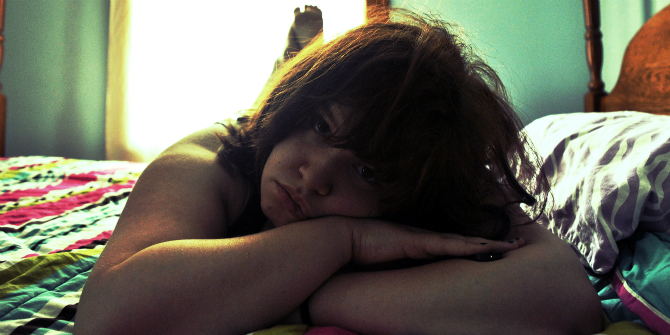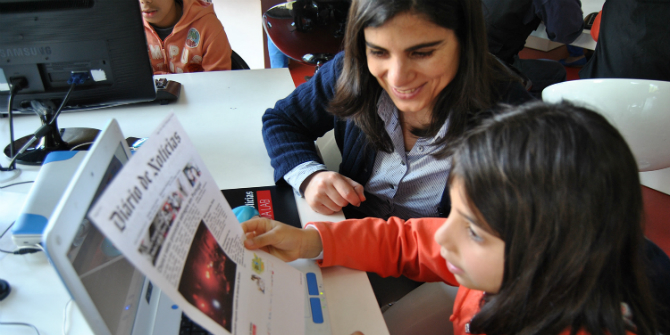 Sonia Livingstone takes a closer look at increasing concerns around young people’s mental health and the implication that the internet is at fault. She argues that there is not enough research evidence to support this and many other causes for children’s problems are being ignored. Sonia is Professor of Social Psychology at LSE’s Department of Media and Communications and has more than 25 years of experience in media research with a particular focus on children and young people. She is the lead investigator of the Parenting for a Digital Future research project. [Header image credit: K. Marie, CC BY-NC-ND 2.0]
Sonia Livingstone takes a closer look at increasing concerns around young people’s mental health and the implication that the internet is at fault. She argues that there is not enough research evidence to support this and many other causes for children’s problems are being ignored. Sonia is Professor of Social Psychology at LSE’s Department of Media and Communications and has more than 25 years of experience in media research with a particular focus on children and young people. She is the lead investigator of the Parenting for a Digital Future research project. [Header image credit: K. Marie, CC BY-NC-ND 2.0]
Children and youngsters spend more and more time online (as do we all), often alone or at least only in touch with others remotely through the internet. This poses various questions for parents concerned about what their children now spend much of their days doing.
A recent survey of headteachers reported a growing number of children self-harming as mental health problems among pupils rise. This has led to calls for improvements to children’s mental health care.
Last year, it was reported that heavy web use harms a child’s mental health, with each extra hour online compounding the problem. And research collated by Public Health England in 2014 reported that ChildLine now receives greater numbers of calls linked to internet-related problems such as cyberbullying.
What’s the implication here? That children are facing real and growing mental health problems? Or that parents, teachers and doctors are more aware of mental health problems among children?
Looking more closely at the suggestion that the internet is to blame, the headteacher survey didn’t track an increase in actual numbers over time, but rather asked head teachers if they perceived an increase – not exactly a rigorous standard of evidence.
I’d rely more on the representative national surveys of children conducted as part of the Good Childhood Report 2015, in which four waves of surveys from 2009 to 2013 revealed little change in the self-reported “subjective well-being” of British 10-17 year olds, neither for better nor worse.
Another, the Key Data on Adolescence report covering 1997-2015, agrees that “the majority of young people rate their well-being as good”, although there is older data that shows around 10% of five- to 16-year-olds suffer from a diagnosable mental health disorder. As they add, even though three quarters of mental health problems start before the early 20s, funding cuts mean that we lack up to date evidence on whether mental health problems are rising – or not.
It’s no surprise that critical sociologist Frank Furedi says that it’s time to stop getting anxious about the anxieties it’s claimed are found in children.
Guilt by correlation, not causation
The implication that the internet is responsible for these problems in children ignores the many alternative causes. The increased exam pressure, for example, or expectations for success weighing children down. We should also consider the debate over the reality of what internet or gaming “addiction” might really mean – the statistics are slight to say the least, and don’t really bear out the public’s concerns.
Blaming the internet for everything underplays the potential benefits, for mental health or otherwise, from internet use which may compensate for any drawbacks. The Children’s Commissioner for England reported that children are seeking mental health advice onlinein preference to asking their doctor or school nurse, for example. And ChildLine reported that most (82%) of their counselling sessions about suicide in 2013/14 were conducted through email or one-to-one online chat – a considerable increase.
ParentZone has just released some new research on the subject. There are some interesting findings in the report, but one point especially jumps out and helps make sense of my doubts about the “evidence” or otherwise regarding children and the internet.
The survey of students aged 13-20 and teachers is a small sample, but it suggests a great difference in perception between the two groups. Around a quarter (28%) of students felt that the internet is bad for young people’s mental health, while the perception that it was bad for children rose to around half (44%) among teachers. Around 45% of students said they would follow advice read online, but 86% of their teachers thought that their students would.
Asked about the biggest influences on young people’s mental health, teachers felt that family (49%) was a positive influence but saw the peer group (27%) and the internet (24%) as negative influences. Yet they rarely saw parents (9%) or family (8%) as negative influences, in stark contrast to the reasons children give for calling ChildLine, for instance, which are topped by family and school problems.
We cannot identify from this the true source of children’s difficulties. But it’s striking that teachers are more negative about the internet than their students are – and more negative about their students, too, thinking of them as gullible or uncritical about their use of the internet. Given this, it’s hardly surprising that headteachers blame the internet for the problems in children’s lives. And the space between these views makes it all the more important for more rigorous research to be carried out.
So I’m not arguing that the internet isn’t bad for children’s mental health. But I am arguing that we really don’t know either way – despite the overwhelming anxieties portrayed in the media. And given the amount of attention that continues to be devoted to this question, that’s a sorry state of affairs.
NOTES
This text was originally published on The Conversation and has been re-posted with permission.






